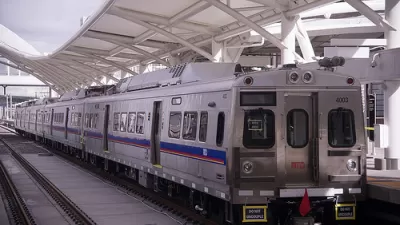After a February Metrolink commuter train crash in Oxnard, Calif., train officials hailed the new Korean rail cars as having performed well. Now they have expressed second thoughts, and are replacing the front cab cars with BNSF locomotives.
Officials of Southern California's 388-mile commuter rail line, Metrolink, were counting on their new Hyundai Rotem Co rail cars, manufactured in South Korea, to be safer than the Bombardier cars they replaced. After a Feb. 24 crash in Oxnard that derailed all four cars, injured 27, and killed the engineer, they have taken one type of the new cars out of service, notwithstanding the positive comments they made about the crashworthiness of the cars immediately after the incident.
"Now, however, Metrolink is trying to determine whether a design flaw in one of the state-of-the-art cars played a role in derailing the train," writes Dan Weikel for the Los Angeles Times. "On (Sept. 3), railroad officials announced that they will restrict the use of 57 of the new passenger cars that have control cabs for engineers and operate at the front of trains when they are being pushed from behind by locomotive."
Weikel is describing the "push-pull" operation of many commuter rail lines, where a locomotive pulls the train in one direction, and then the train reverses direction without changing the placement of the locomotive. The locomotive then pushes the train while a control cab, or cab car (see photo), as it is often called, allows an engineer to control the train from the lead car, which also carries passengers.
It was a new Hyundai Rotem cab car, not a locomotive, that hit a truck on the tracks in Oxnard on Feb. 24, and notwithstanding its new design, derailment, injuries, and death followed.
"We are taking this additional step as a redundancy to keep our riders safe," said Metrolink Chief Executive Art Leahy, referring to the replacement of cab cars with locomotives, thus temporarily ending push-pull operation. The cab cars will be utilized as coach cars.
Weikel goes on on to describe the part of the cab car that is being investigated. The freight locomotives will be in operation for a year during the investigation.
On September 12, 2008, 25 people died in a Metrolink train crash in Chatsworth (posted here). The February 24 crash with a truck that had turned onto the tracks is still under investigation by the National Transportation Safety Board (NTSB).
FULL STORY: Metrolink examining safety of state-of-the-art rail cars in wake of Oxnard crash

Planetizen Federal Action Tracker
A weekly monitor of how Trump’s orders and actions are impacting planners and planning in America.

Maui's Vacation Rental Debate Turns Ugly
Verbal attacks, misinformation campaigns and fistfights plague a high-stakes debate to convert thousands of vacation rentals into long-term housing.

Restaurant Patios Were a Pandemic Win — Why Were They so Hard to Keep?
Social distancing requirements and changes in travel patterns prompted cities to pilot new uses for street and sidewalk space. Then it got complicated.

Charlottesville Temporarily Has No Zoning Code
A judge ordered the Virginia city to throw out its newly revised zoning code, leaving permitting for new development in legal limbo.

In California Battle of Housing vs. Environment, Housing Just Won
A new state law significantly limits the power of CEQA, an environmental review law that served as a powerful tool for blocking new development.

Boulder Eliminates Parking Minimums Citywide
Officials estimate the cost of building a single underground parking space at up to $100,000.
Urban Design for Planners 1: Software Tools
This six-course series explores essential urban design concepts using open source software and equips planners with the tools they need to participate fully in the urban design process.
Planning for Universal Design
Learn the tools for implementing Universal Design in planning regulations.
Heyer Gruel & Associates PA
JM Goldson LLC
Custer County Colorado
City of Camden Redevelopment Agency
City of Astoria
Transportation Research & Education Center (TREC) at Portland State University
Jefferson Parish Government
Camden Redevelopment Agency
City of Claremont



























